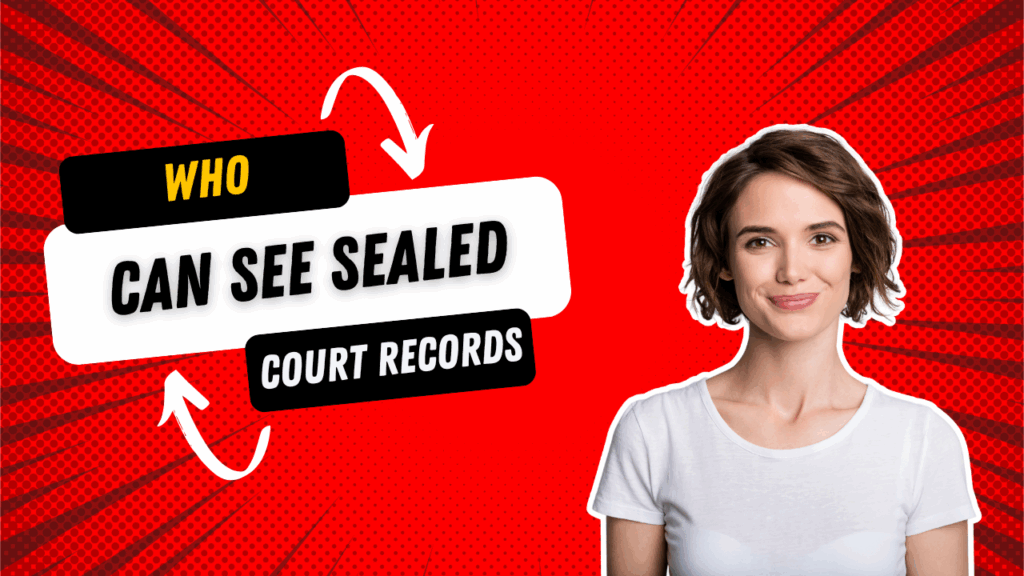A sealed court record sounds private. But is it really? Not always.
If a record is sealed, that means the court has restricted public access. But some people and groups can still see it.
Here’s who gets a peek, and how to protect your privacy anyway.
Dig Deeper: How to Remove Court Records from Google Search
What Is a Sealed Record?
Not the Same as Expunged
When a record is sealed, it’s hidden from the general public. This includes most employers, landlords, and background check companies.
But the record still exists. It hasn’t been erased. Courts, law enforcement, and certain agencies can still access it.
One user said, “I thought sealing meant it was gone. Then a government job still saw my old charge. I had no idea they could.”
Expungement wipes the record out. Sealing hides it from view. But not from everyone.
Who Can Still See a Sealed Court Record?
Law Enforcement
Police officers and detectives can access sealed records. So can federal agencies like the FBI. They use them for background checks, investigations, and security reviews.
If you apply for a job that involves a badge or clearance, expect this to come up.
Government Agencies
Some agencies are allowed to see sealed records, especially when it involves licensing or public safety.
These include:
- Immigration services (USCIS)
- Military branches
- TSA and airport screening
- Department of Homeland Security
- State licensing boards
If you want a license to be a nurse, teacher, or lawyer, they may see the sealed file.
Courts and Judges
If you’re ever in court again, judges may review your sealed records. This could impact sentencing or how your new case is handled.
It doesn’t matter if it’s sealed. The judge may still use it to understand your history.
Prosecutors
If a new charge comes up, prosecutors can review past sealed records. They may use it in plea deals or sentencing arguments.
It won’t show up on public court sites, but it stays in the system.
You and Your Lawyer
You can always request a copy of your sealed record. So can your lawyer. This helps with future legal actions or corrections.
If you find errors, your attorney can file motions to fix them.
Some Employers (Rare Cases)
Most jobs won’t see sealed records. But certain roles may trigger a deeper background check.
Jobs in finance, law enforcement, child care, or healthcare may give companies legal access to sealed information. This varies by state.
One job applicant shared, “I applied for a hospital role. They didn’t see my sealed theft charge, but they asked if I had ever been in court. So I told them.”
Sealing helps, but honesty still matters.
Who Can’t See Sealed Records
Most Employers and Landlords
Standard background checks will not show sealed records. These companies only use public databases. If the court has sealed your case, it won’t appear.
The General Public
Friends, neighbors, and nosy coworkers can’t pull up your sealed record. It won’t be on Google. It won’t show in local court searches.
Background Check Websites
Sites like Spokeo, BeenVerified, and TruthFinder scrape public data. If the case is sealed, they usually lose access.
But copies made before sealing might still float around. This is why suppression still matters.
Sealing Stats and Trends
In the U.S., over 70 million people have a criminal record. According to the Brennan Center, only a small fraction qualify for sealing or expungement, and even fewer apply.
States like California, Michigan, and Pennsylvania have started automatic sealing for minor offenses. This is helping reduce long-term harm.
Still, if your record was sealed manually, you may need to take extra steps to protect your privacy.
What You Can Do to Stay Safe
1. Request a Copy of Your Record
Ask your court or attorney for a sealed record certificate. It helps in case someone falsely claims to have found it online.
2. Check Google and Data Sites
Search your name every few weeks. Look for old copies of your case. If you find one, file a removal request or use Google’s Outdated Content Tool.
3. Suppress With Positive Content
Sealed doesn’t always mean gone. Suppress any lingering search results with better content:
- LinkedIn updates
- Personal websites
- Press mentions
- Guest posts
Use your full name to push up the good and hide the old.
4. Monitor Your Reputation
Tools like a reputation management service can help you watch for new mentions and keep your name clean online.
Top Shelf Reputation, for example, helps track sealed records, remove outdated info, and flood the web with stronger results.
5. Be Honest When Needed
If a background check legally includes sealed records, be ready to explain. Don’t lie on federal job forms or security clearance applications.
But you don’t need to disclose sealed info in most everyday situations. Know your rights.
Final Thoughts
Sealing a record is a strong move. It stops most people from seeing your past. But a sealed record isn’t invisible.
Police, judges, and certain agencies can still access it. Some employers may get a look in rare cases.
That doesn’t mean you’re stuck. Monitor your name, take control of your search results, and use smart tools to stay ahead.
A sealed record shouldn’t control your future. But it’s up to you to make sure it doesn’t.
Need help? Top Shelf Reputation specializes in managing court records online, even when they can’t be fully removed. Contact us today to take back control of your online image.

